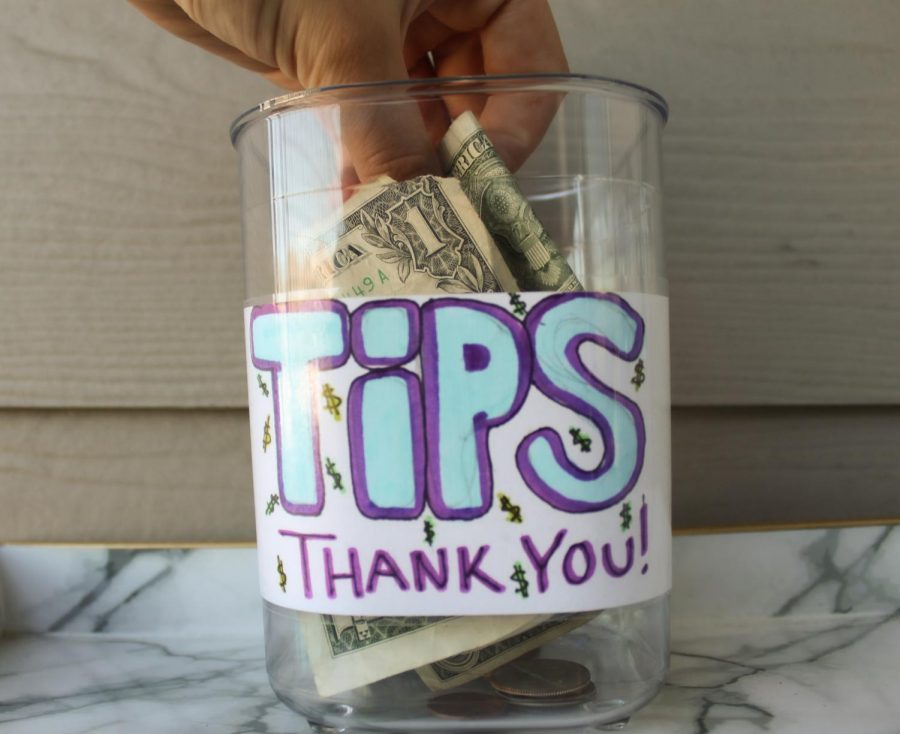Cushman: Ending Tip Culture is Part of #MeToo
A tip jar in Salt Lake City, Utah on Tuesday, Sept. 21, 2021. (Photo by Brooklyn Critchley | The Daily Utah Chronicle)
February 14, 2023
Kiernan Dunn was formerly a contributor for Wasatch Magazine. She is speaking in her capacity as a barista and not a member of U student Media, of which the Chronicle is a part of.
The Speak Out Act’s passage in both congressional houses indicates an important victory for the #MeToo movement. The law “prohibits the use of nondisclosure and nondisparagement agreements in the case of sexual harassment and assault,” according to SHRM Online. This will protect employees from bad faith nondisclosure agreements so they can speak out about sexual harassment and assault. However, more work must be done to fight against systemic sexual victimization by eliminating the tipped minimum wage.
An Inherent Power Dynamic
Tipped workers endure a grim reality. According to MIT’s Living Wage Calculator, a living wage in Utah in 2022 would be $16.98 an hour for a single adult with no children. Minimum wage workers receive much less than that at $7.25 an hour, but the tipped minimum wage is only $2.13 an hour.
In her article about working for tips as a server in Utah, C.J. Alexander described paychecks ranging from $0 to $25. Sometimes, she even owed her employer money to cover her taxes. The extremely low tipped minimum wage makes tipped workers reliant on tips to supplement their wages. This inherently makes working for tips stressful because wages are subject to wide variability. Therefore, what a tipped worker earns can’t ever accurately capture the dollar amount that a server’s hard work is worth. These workers face more stress now than ever. During the pandemic, customers began tipping less and less frequently.
Tipped workers rely on the fickleness of customer opinion and must provide customers with a positive experience to pay their bills. It gives customers all the power in interactions with wait-staff while workers try not to offend the people responsible for their compensation. But what does that mean for workers, especially women, when customers flirt with them? What kind of pressure might that place on service workers to flirt with customers or wear more revealing clothing?
Sexualization of Tipped Workers
I spoke with five Utah tip earners and they all echoed similar sentiments. University of Utah senior Kiernan Dunn works as a barista and about half of her earnings come from tips. She expressed how wearing pigtails or not wearing a bra tends to get her higher tips. Researchers call this phenomenon, where there is a focus on the workers experience, “body work.” Dunn expressed feeling “weird” about actively engaging in her own sexualization. Another tip worker, Lauren Dutson, explained that body work makes her feel like customers see her “like an object.” While working as a barista as a teenager, Amya Gunderson even had body work pushed on them by a manager. They said, “He liked when we wore skirts because when we bent over, it made us more tips.”
Each tip worker I spoke to said they experienced flirting from customers. Sam Rust, while working as a restaurant host, had a customer about a decade older than them ask for their number, but they said no. When he came in again while Rust worked, he complained to the manager about the hosts being rude and left no tip for the server. Rust felt this was because they “had not given this decade-older man my number.”
Workers feel like they have to play along in order to receive compensation for their work. The consequence of not acting friendly enough, even in uncomfortable situations, is wage insecurity. Solveig Christianson said that toward the beginning of her time as a server, her reaction to flirty or inappropriate behavior from customers came from her concern about tips. Christianson said she quit because serving made her “lose faith in humanity.” After serving, she “had to stop working for tips for months” because her “sense of worth” and her wages became so dependent on how she handled rude and inappropriate customer behavior.
Once again, I found a commonality. They all expressed appreciation for good managers who made them feel comfortable. Dunn explained that at her current tipped job, she feels like her “concerns would be accepted and managed” by her supervisors. Christianson said a safe work environment “requires that your boss or manager doesn’t push these things off.” With poor management, tipped workers can face even greater sexualization, as was the case with Gunderson’s manager who pushed body work on his employees.
Many of the workers I spoke to had negative experiences at places with management who handled sexualization and harassment poorly. Unsupportive management pushed them to seek out different work environments. Good management clearly makes a difference in how safe employees feel, but safety at work shouldn’t depend on quality of management.
End the Tipped Wage
Research shows that action regarding sexual harassment is largely “informal, temporary and targeted at the particular and immediate situation.” Safe work environments shouldn’t be temporary. We need to attack the systemic problems that put workers in danger. For tip-reliant workers, that means ending the tip system and providing fair wages.
We shouldn’t support a labor system that makes payment for labor conditional or pressures workers to make themselves sexually appealing or open to sexual advances at work for compensation. To advocate against sexual harassment and assault, we need to do better. This means defeating the tipped minimum wage.








